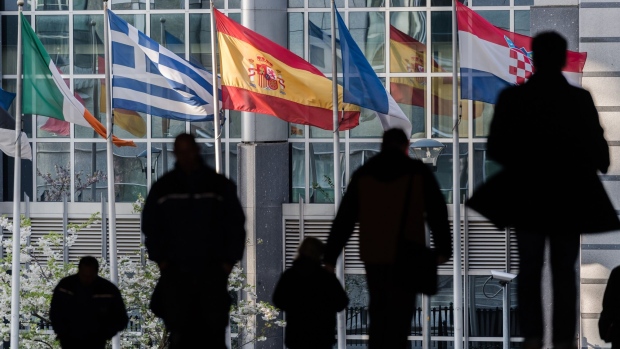Jun 20, 2019
Spying Fears Prompt EU to Jam Leaders' Phones at Brussels Summit
, Bloomberg News

(Bloomberg) -- The European Union is jamming mobile phone signals in the room where leaders are holding a summit on Thursday over fears details of their secret discussions could fall into the wrong hands.
In an unusual step, the 28 leaders, who are likely to spend many hours debating who will take over the bloc’s top institutional posts, will also be banned from bringing their diplomatic advisers into the room, according to three officials with knowledge of the decision. The EU carried out a trial run at a similar gathering last month and leaders have agreed that it should become more normal, said one of the officials, who asked not to be named because the the discussions were private.
The move reflects increasing worries about the misuse of mobile technology around the negotiating table and suspicions that foreign powers, such as China and Russia, are trying to penetrate the discussions, according to diplomats.
Until now, leaders would typically have aides with them in the summit room, or in a separate listening area, giving advice and liaising with counterparts. Some leaders have also started using their cellphones during the discussions, tweeting decisions, texting information from the room to their advisers or to their governments back home, or even to send photographs of confidential documents.
EU officials acknowledge that Brussels, home to the headquarters of the EU and the North Atlantic Treaty Organization, has one of the largest numbers of spies of any city in the world. When Brexit negotiations started in 2016, British officials were warned to be more cautious and to avoid chatting in places where spying and eavesdropping are more likely. The city has hundreds of Russian and Chinese spies, some who try pose as accredited journalists, according to officials.
A senior EU diplomat, who would normally accompany his country’s prime minister in the summit room, said leaders were worried about security and were aware of the need to become more resilient against outside threats.
Leaks to journalists and rival EU diplomats were making striking deals much more difficult, he said. Diplomats have complained about a photograph that the Bulgarian ambassador to the EU posted on Twitter during a summit in March that showed senior officials, who normally shun the limelight, scrutinizing the latest draft of the EU’s position on Brexit in a corridor while leaders were continuing their discussions in the main room.
Over the past two years, the EU has started to routinely confiscate phones from national diplomats discussing negotiations over the U.K.’s withdrawal from the bloc.
Last year, Sabine Weyand, then the EU’s deputy chief Brexit negotiator, told diplomats during private talks that the U.K. had obtained her confidential presentation. This, she said, meant that it was possible British intelligence agents were listening into their meetings, according to a person present.
To contact the reporter on this story: Ian Wishart in Brussels at iwishart@bloomberg.net
To contact the editors responsible for this story: Ben Sills at bsills@bloomberg.net, ;Chad Thomas at cthomas16@bloomberg.net, Richard Bravo, Zoe Schneeweiss
©2019 Bloomberg L.P.





